|
By: Fr. Paul Dordal 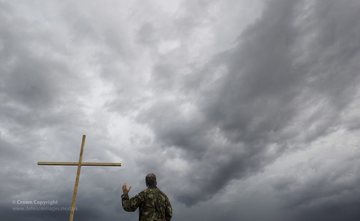 The Sky Pilot I am convicted. I have been a poser. I am repenting. I am a pacifist. As I was struggling with a moral injury suffered, in large part, because of my service in Iraq as an Army Chaplain, a friend suggested in early 2015 that I read Leo Tolstoy’s The Kingdom of God is Within You. The first few pages affected me deeply. Tolstoy said, “Among the many points in which [the Institutional Church’s] doctrine falls short of the doctrine of Christ I pointed out as the principal one the absence of any commandment of non-resistance to evil by force. The perversion of Christ’s teaching by the teaching of the Church is more clearly apparent in this than in any other point of difference.” 1 As I read Tolstoy I could hear again the words of Eric Burdon song’s Sky Pilot. I realized then that in order for me to live more authentically as a Syro-Chaldean Catholic priest, a Veterans Affairs Hospital Chaplain, but more poignantly as a former US Army Chaplain and veteran of the war in Iraq, I was going to have to change: He blesses the boys as they stand in line/
Comments
7/4/2016 Comments The Violence of NormalBy: Regina Shands Stoltzfus  Note: this article was originally published on Sojourners. As a professor of peace, justice, and conflict studies at a small liberal arts college in the Midwest, I spend a lot of time talking about violence. Early in the semester, I have my students complete a group exercise: They are given 21 sheets of paper, each sheet with an action on it, and instructions to create a continuum of these actions that span from least violent to most. These actions include kicking, starting rumors, leering, shooting someone, stabbing someone, writing graffiti, name-calling. Typically, the exercise begins easily enough—shooting and stabbing quickly make their way to the “most violent” end of the continuum. But from there, the more diverse the identities and life experiences of the students, the more difficult the exercise becomes. With that, a conversation emerges that carries over into the rest of the semester, as students each identify an aspect of violence that they will research. The question that undergirds their research, and the course itself, is, “What is the societal permission for this kind of violence?” As a nation, we expressed horror at the vile act of violence in Orlando, Fla., nearly coinciding with the one-year anniversary of more violence in Charleston, S.C. We mourn and debate stricter gun laws. Yet we ignore steps on the continuum to violence that has made such shootings almost routine. 3/11/2015 Comments Violence is Violence?: Inter-generational Strife, Self-Defense, and the Black Lives Matter MovementBy: HH Brownsmith 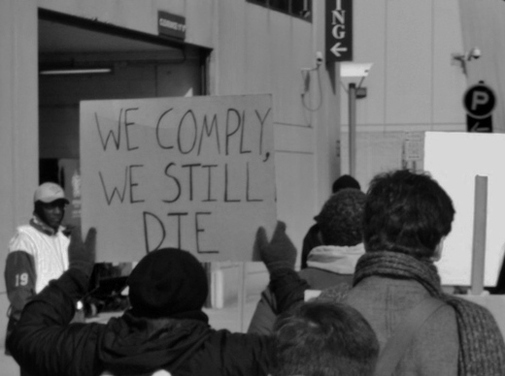 HKonJ March in Raleigh, NC. February 14, 2015. HKonJ March in Raleigh, NC. February 14, 2015. The Bible is brimming with instances of people waiting for a prophet or movement only to have that person or mobilization arrive and go unrecognized or, worse yet, be violently suppressed because it doesn’t conform to the expectations of the waiting masses. Since I started working and/or living in radical Christian settings seven years ago, I have heard elders wax nostalgic about the civil rights movement. I have watched older folks who lived during the end of the Jim Crow era weep when discussing their own recognition of that important historical and cultural shift. I have also watched elders chastise young folks, sometimes rightfully, for failing to care about this history; the nonviolent tactics employed; and the ways hearts, minds, and institutions were forever altered. I write about a lot of issues with the marginal confidence of a generalist. But if there is an issue on which my nerve consistently fails it is on the generational tension and resulting divide as it exists in the radical Christian left. This issue of generational conflict feels close…maybe too close. I have watched the “old guard” in established Christian communities push out younger folks for misunderstandings that boil down to generational politics (i.e. democratic socialism vs. anarchism). I have watched young people leave established churches to start generationally homogenous churches of their own. And, of course, I have seen so many people under 40 leave parish ministries and take their seminary training to chaplaincy work or academia. Wondering if perhaps there was something to our elders complaints that young folks are disrespectful and too "now focused", I decided to really seek instruction from "the silent generation". I am a member of a church with only 3 consistently attending members in their 20s (my partner and I are included in that number). I am now employed by that church. And over the last year I was part of an apprenticeship program administered by this church and five of my favorite ministers, all but one of whom is over sixty. This experience of committing to a religious community and earnestly trying to understand the stories that my generation supposedly won’t hear has given me a stronger understanding of our elders’ position. Naturally, greater understanding makes critique even harder. But I do hope that it gives the resulting critique the weight of a well-informed position. 7/2/2013 Comments Jesus' bad exampleBy: Charletta Erb  Editor’s Note: This satirical piece is a part of the Overturning Tables Project…for more information, visit overturningtables.org. Oh how I wish Jesus had set a better example! Let’s be reasonable here. He should have proposed his prophetic action in consultation with the religious leadership far in advance of the Passover feasts. This would have reduced so much stress for the Pharisees and scribes. He shouldn’t have made his case using sacred scriptures. Too risky, too radical, too much playing his religion card like he knew it all. Why did he have to bring Isaiah or Jeremiah into this, crazy activists claiming God’s house for foreigners, eunuchs and the like! One issue at a time now! How dare he come to the temple with an agenda! 10/30/2012 Comments Serving for CitizenshipBy: HH Brownsmith 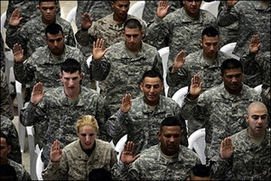 According to the United States Bureau of Citizenship and Immigration, defending one’s country is one of the responsibilities of citizenship. During the Civil War, WWI, WWII, and the Vietnam War black men enlisted with hopes of returning from the battlefield to greater equality in the states. Japanese people joined up during WWII to avoid internment camps. Latino folks have been and are continuing to be recruited for the war in Afghanistan with the promise of an expedited path to citizenship. As disgusting as this bargaining is, the model is not hard to understand. You kill for us and we’ll call you an American (if the political and cultural climate allows for that and you don’t die). But what if you aren’t given the initial “privilege” to enter into battle for the country? Some gay, lesbian, and bisexual people struggled with this conundrum from the creation of the armed services until September 2011. In the lead up to the repeal of Clinton’s Don’t Ask Don’t Tell Don’t Pursue policy, the debate became unsurprisingly dichotomous. Straight moral conservatives and a couple of churches (the Roman Catholic Church and the Southern Baptist Convention, namely) issued statements against the repeal. Liberals, including some affirming churches, and mainstream gay activists spent all their energy telling the world that members of the LGB community deserve the chance to fight and die for American interests. Meanwhile, other peace churches were holding their tongues on the sidelines and radical queer liberationists were being ignored, per usual. 12/20/2011 Comments A Bloodless ZealBy: James Hamrick 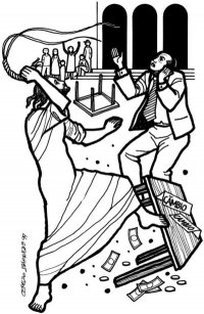 Whenever I talk to Christians about the non-violent way of Jesus they inevitably bring up an incident from Jesus’ life that ‘proves’ that pacifism is nonsense: his cleansing of the temple. All four canonical Gospels tell us that Jesus went to Jerusalem, entered the temple, and proceeded to chase people and animals out, overthrow tables, and cause an overall ruckus. The Gospel of John even tells us he used a whip. “That certainly doesn’t sound like something a pacifist would do!” Unfortunately, this story is not the slam-dunk that violent Christians think it is. Ultimately there is no contradiction between Christian pacifism and Jesus’ action in the temple. 10/28/2011 Comments Confessing Pacifism, Repenting in LoveBy: Nichola Torbett 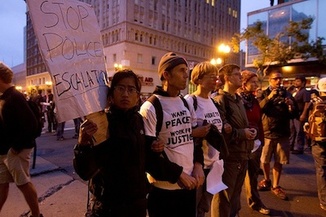 A few weeks ago, I wrote a piece for this website that called for a confessing movement. Consider this my first confession, inspired largely by my participation in Occupy Oakland. Until recently, I have been what one of friends calls a “nonviolence fundamentalist.” Inspired by the movements of Mahatma Gandhi and Martin Luther King, Jr., among others, I have had a deep intuitive sense that our means of social change must be consonant with the ends we wish to achieve. If it is not just a reversal of oppressions that we seek to achieve but a real reign of love, then we must get there without straying from love. I believe this is also the message of the gospel, in which Jesus of Nazareth maintained his commitment to love, manifest in nonviolence, all the way to the cross and beyond, initiating a Reign of Love that is somehow both “at hand” now and yet not fully here, and by the tenants of which I am, as a disciple of Jesus, called to live now, no matter the cost. In an attempt to live out that discipleship, I have chosen to engage in justice struggles only when those struggles have been predicated on a strong commitment to nonviolence; as a result, there have been many movements with which I have not engaged and which I have sometimes even critiqued. These include many led by low-income communities of color. As woman with white-skin privilege and middle-class connections, I must repent of that now. By: Frank Cordaro 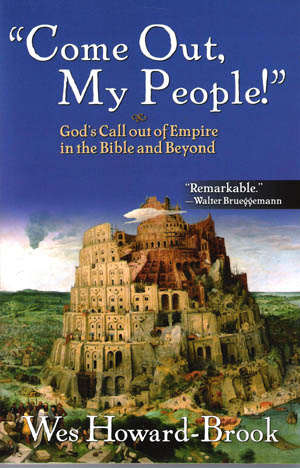 I have wanted to read this book for many years. It just was not written yet. Now that it is, we Catholic Workers and faith-based-nonviolent-resistance-to-the-USA-Empire type folks owe Wes Howard-Brook a debt of gratitude. Not since reading Ched Myers’s ground-breaking Binding the Strong Man has a book so influenced my reading of the scriptures. What Myers did with the Gospel of Mark, Howard-Brook does for the whole Bible by laying out a template for reading it. Come Out, My People! addresses two major issues that have plagued my reading of the Bible. The first is the seeming great divide between the New and Old Testaments, or what we Christians have called our “Jewish question.” James Carroll’s book Constantine’s Sword, documents this tragic misreading of the scriptures and the bloody history that has followed. The current political discourse surrounding the State of Israel shows that these issues are still very much with us and not going away anytime soon, My second issue surrounds the question of violence in the Bible. Jack Nelson-Pallmeyer’s book Jesus Against Christianity highlights this perplexing issue well. Nelson-Pallmeyer asks the question, how are we who believe in the nonviolent Jesus and the unconditionally loving God of unlimited forgiveness with the violent deeds attributed to God and God’s people in the Bible? Nelson-Pallmeyer‘s answer is a bold and liberating one. If we really believe in that Jesus and that God, then where ever God is portrayed as violent in both the New and Old Testaments, the violence is human pathology imposed on the text. I find Nelson-Pallmeyer’s answer very appealing. It rings true in my spiritual guts. Yet it is somehow too convenient, too easy a solution. It does not adequately or systematically deal with the Bible’s violent biblical texts. 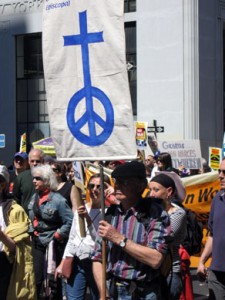 Editor’s Note: Make sure to read parts one, two, and three before this last part in Dan Oudhorn’s series challenging the somewhat flimsy ways we’ve tried to embrace the way of Jesus even as we accommodate the “death-dealing powers of our day.” Be forewarned–this is the most provocative part of the series. All too often, those involved in Christian communities are so solely focused upon enacting a creative, life-giving alternative that they end up neglecting the concomitant work of resistance to the death-dealing powers of our day. This is a point I have inherited from cultural theorists and philosophers like Jean-Paul Sartre, Michel Foucault, and Jacques Derrida. If, in the context of death, we wish to participate in something that is new and life-giving, then we must simultaneously, if not first of all, engage in the destruction of that which is death-dealing. So, for example, taking feminism seriously requires us to not only ensure that women and men are accorded the same status and judged by the same standards; it also requires us to abolish previous structures, attitudes, and discourses that were patriarchal and androcentric. Or, to take a second example, we can see how the worship of YHWH necessarily requires the Israelites to destroy their idols in the Old Testament, and necessarily requires Jesus to overturn the tables of the moneychangers in the New Testament. Therefore, if we are hoping to be involved in communities of new creation, committed to life, love, solidarity, and justice; then we must also be committed to resisting and destroying that which is given over to death, hatred, alienation and injustice. It is not enough for us to simply focus upon being a creative alternative to the status quo. We must also attack the status quo. Doing so does not mean that we have given in to a “false soteriology”. I once thought this, given the way I have been influenced by the Duke School and scholars like Stanley Hauerwas and William Cavanaugh. Both Hauerwas and Cavanaugh have made convincing arguments that liberal democracies operate with a false soteriology and look to the State for salvation… when in actuality salvation is found in Christ and in the Spirit-empowered community of those who follow him. |
Disclaimer
The viewpoints expressed in each reader-submitted article are the authors own, and not an “official Jesus Radicals” position. For more on our editorial policies, visit our submissions page. If you want to contact an author or you have questions, suggestions, or concerns, please contact us. CategoriesAll Accountability Advent Anarchism Animal Liberation Anthropocentrism Appropriation Biblical Exegesis Book Reviews Bread Capitalism Catholic Worker Christmas Civilization Community Complicity Confessing Cultural Hegemony Decolonization Direct Action Easter Economics Feminism Heteropatriarchy Immigration Imperialism Intersectionality Jesus Justice Lent Liberation Theology Love Mutual Liberation Nation-state Nonviolence Occupy Othering Pacifisim Peace Pedagogies Of Liberation Police Privilege Property Queer Racism Resistance Resurrection Sexuality Solidarity Speciesism Spiritual Practices Technology Temptation Veganism Violence War What We're Reading On . . . White Supremacy Zionism ContributorsNekeisha Alayna Alexis
Amaryah Armstrong Autumn Brown HH Brownsmith Jarrod Cochran Chelsea Collonge Keith Hebden Ric Hudgens Liza Minno Bloom Jocelyn Perry Eda Ruhiye Uca Joanna Shenk Nichola Torbett Mark VanSteenwyk Gregory Williams Archives
October 2017
|
Search by typing & pressing enter

 RSS Feed
RSS Feed